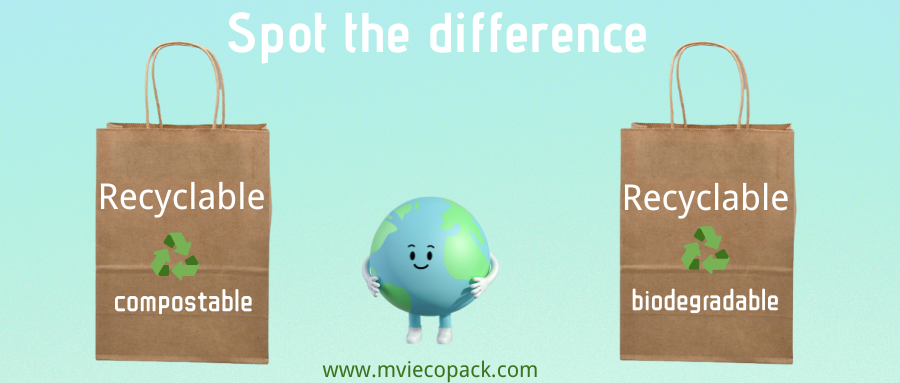
With increasing environmental awareness, more and more people are paying attention to the impact of everyday products on the environment. In this context, the terms "compostable" and "biodegradable" frequently appear in discussions. Although both words are closely related to environmental protection, they have significant differences in meaning and practical application.
Do you recognize this difference? Many consumers believe these two terms are interchangeable, but that’s not the case. One of them can contribute to diverting waste from landfills and promoting a circular economy, while the other can break down into toxic fragments, becoming environmental pollutants.
The issue lies in the semantics of these two terms, which can be explained as follows. Many terms are used to promote the sustainability products, making it a complex and multidimensional topic that is hard to summarize in a single word. As a result, people often misunderstand the true meaning of these terms, leading to incorrect purchasing and disposal decisions.
So, which product is more environmentally friendly? The following content will help you better understand the differences between these two concepts.
What Is Biodegradable?
"Biodegradable" refers to a material's ability to break down in the natural environment through microorganisms, light, chemical reactions, or biological processes into smaller compounds. This means that biodegradable materials will degrade over time, but not necessarily in a quick or complete manner. For example, traditional plastics can be biodegradable under specific conditions, but they may take hundreds of years to fully decompose, releasing harmful microplastics and other pollutants in the process. Therefore, "biodegradable" does not always equate to being environmentally friendly.
There are various types of biodegradable materials, including those that degrade through light (photodegradable) or biologically. Common biodegradable materials include paper, certain types of plastics, and some plant-based materials. Consumers need to understand that although some products are labeled "biodegradable," this does not guarantee they will be harmless to the environment in a short period.
What Is Compostable?
"Compostable" refers to a more stringent environmental standard. Compostable materials are those that can completely break down into water, carbon dioxide, and non-toxic organic matter under specific composting conditions, leaving no harmful residues behind. This process typically takes place in industrial composting facilities or household composting systems, requiring proper temperature, humidity, and oxygen conditions.
The advantage of compostable materials is that they provide beneficial nutrients to the soil, promoting plant growth while avoiding the methane emissions generated in landfills. Common compostable materials include food waste, paper pulp products, sugarcane fiber products (such as MVI ECOPACK’s sugarcane pulp tableware), and corn starch-based plastics.
It is important to note that not all biodegradable materials are compostable. For example, some biodegradable plastics may take a long time to decompose and may produce harmful chemicals during the degradation process, making them unsuitable for composting.


Key Differences Between Biodegradable and Compostable
1. Decomposition Speed: Compostable materials usually fully decompose within a few months under specific conditions (such as industrial composting), while the decomposition time for biodegradable materials is uncertain and could take years or even longer.
2. Decomposition Products: Compostable materials leave no harmful substances behind and only produce water, carbon dioxide, and nutrients. Some biodegradable materials, however, may release microplastics or other harmful chemicals during the degradation process.
3. Environmental Impact: Compostable materials have a more positive impact on the environment as they help reduce landfill pressure and can serve as fertilizer to improve soil quality. In contrast, although biodegradable materials reduce plastic waste accumulation to some extent, they are not always environmentally friendly, especially when they degrade under inappropriate conditions.
4. Processing Conditions: Compostable materials usually need to be processed in an aerobic environment, with optimal conditions typically found in industrial composting facilities. Biodegradable materials, on the other hand, can degrade in a wider range of environments, but their efficiency and safety are not guaranteed.
What Are Compostable Products?
Compostable products refer to those that can completely decompose into organic fertilizers or soil conditioners under specific composting conditions. The design and material choices of these products ensure they can break down quickly and safely in natural environments or composting facilities. Compostable products typically do not contain any harmful additives or chemicals and, after use, can be transformed into harmless, beneficial substances that provide nutrients to the soil.
Common compostable products include:
- Disposable tableware: Made from materials like sugarcane fiber, bamboo fiber, or corn starch, these items can be placed in composting systems after use.
- Packaging materials: Compostable packaging is mainly used for food packaging, delivery bags, and aims to replace traditional plastic packaging.
- Food waste and kitchen garbage bags: These bags do not negatively impact the composting process and decompose alongside the waste.
Choosing compostable products not only reduces the need for landfills but also helps people better manage organic waste.
Most of MVI ECOPACK's products are certified compostable, which means they have been rigorously tested to ensure they meet the requirements to fully biodegrade into non-toxic biomass (compost) within a specified time. We hold the corresponding certification documents, please contact us. At the same time, we also participate in various large-scale disposable environmentally friendly tableware exhibitions. Please visit our exhibition page for more information.

How to Choose the Right Eco-Friendly Products?
As consumers and businesses, understanding the meaning of the "biodegradable" or "compostable" labels on products is crucial when selecting eco-friendly options. If your goal is to minimize long-term environmental impact, prioritize compostable products such as MVI ECOPACK’s sugarcane fiber tableware, which not only biodegrades but also fully decomposes into beneficial nutrients under the right composting conditions. For products labeled "biodegradable," it is essential to understand their degradation conditions and time frame to avoid being misled.
For businesses, choosing compostable materials not only helps achieve environmental goals but also enhances brand sustainability, attracting more eco-conscious consumers. Additionally, promoting proper disposal methods, such as encouraging consumers to compost at home or send products to industrial composting facilities, is key to maximizing the benefits of these eco-friendly products.
Although "biodegradable" and "compostable" are sometimes confused in everyday use, their roles in environmental protection and waste management are different. Compostable materials play a crucial role in supporting the circular economy and sustainable development, while biodegradable materials require more scrutiny and oversight. By choosing the right eco-friendly materials, both businesses and consumers can make a positive contribution to reducing environmental pollution and protecting the planet’s future.
Post time: Aug-16-2024










